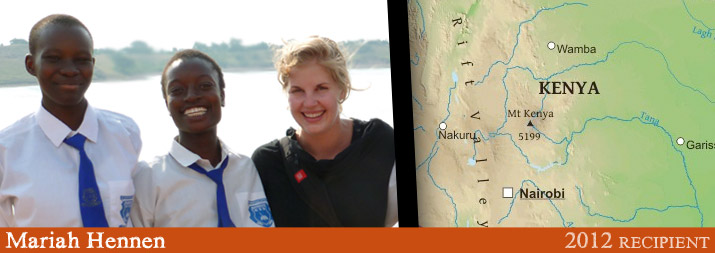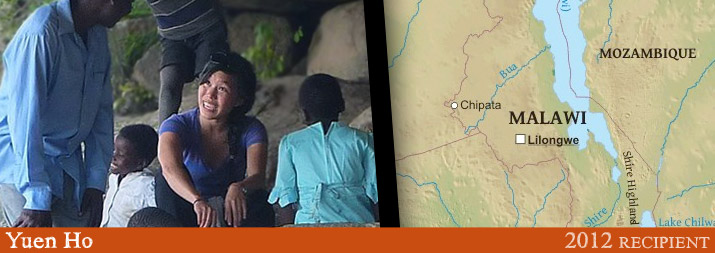
Mariah Hennen, is a student at Kalamazoo College. Mariah spent the summer of 2012 in Kenya where she is worked with The Umoja Project, developing a palliative care program for vulnerable children. Mariah received a $1500 scholarship from Sara’s Wish Foundation.
Here are Mariah’s travel safety tips:
Kenya touched my inner-soul and left there a mark that I wasn’t expecting. I went to Kenya preparing myself for a more professional experience; centering myself on the idea that I was there to intern and my learning would be focused around that experience. However, I left Kenya with more personal and heartfelt experiences, rather than entirely professional. My memories of Kenya are grounded on the people I met, the stories I heard and the times I shared with others. I came expecting to develop professionally; I left having developed as a human-being.
For me, I will always remember Kenya as a time full of joy. As result of the people I met and the work I was fortunate to complete, in Kenya I felt so free, alive and joyful. Kenya supported my growth and challenged me in exciting ways. I attribute my growth primarily to one of distinguishing characteristics of my time in Kenya: the people. In Kenya the tradition of hospitality is genuine and generous. Coming from the United States, a place where the welcoming of strangers is much less common, at times the Kenyan hospitality was overwhelming. Often, it was also humbling; as those who had little offered me whatever they could, sometimes a cup of tea or several avocados harvested from the tree behind the house. No matter where I was, at a school, visiting a home or walking down the road, the happiness to receive visitors was inspiring. These experiences challenged me to think about the way I treat visitors in the U.S., causing me to question whether I am as grateful for the presence of a stranger, as I am happy to welcome a friend. In Kenya I was received joyfully into communities that respected me as person and treated me as friend. Together we celebrated the pleasure that comes from creating relationships and through these relationships I learned about a different culture and about myself.
The Kenya that is portrayed in the media is commonly one of horrible sadness and despair. This is not the Kenya I experienced. While there are terribly difficult situations, there is also so much good occurring. Kenya is filled with incredibly dedicated and truly decent people, who are devoting their lives to creating a better future for all Kenyans. Every day I was inspired by the people I worked with; their abilities to be visionaries of a better world, to empathize with those in their communities and to channel their emotions into productive work. The guardians, the teachers and the religious leaders, who tirelessly dedicate themselves to the orphans and vulnerable children in their communities, taught me about just how positive change occurs when communities come together to work to solve an issue. As I interned in Kenya I was often reminded that related challenges also exist in the United States. Here there are also orphans and vulnerable children, here there are addicts and street children, and here there are people who go to bed hungry. Reflecting upon this, I am challenged to examine whether I am dedicated enough to work to change big issues not only in Kenya, but in the United States. Despite the difficulties around the world, my time in Kenya, being part of an incredible organization and seeing amazing work being done, gave me hope. Change is possible, it just takes commitment.
My time in Kenya was full of personal growth. It provided me the space to reflect on where I have been, where I perceive my life to be going and decide if I was taking the correct steps forward. There was professional growth, too – I did learn an incredible amount about how international partnerships work and the struggles of grassroots work that come along with working directly with communities. Most importantly, I left with a better understanding of if this type of work is my future. It is an unclear answer and I still have much to ponder, but this summer left me with incredible ideas and models for what my life might include. This experience challenged me to contemplate about what healthy lifestyles are, to think critically about U.S. involvement in international NGOs and to reflect upon my remaining college years. This summer opened up new doors and reaffirmed my passion and excitement for the future.
I left Kenya with family, friends and a place to go back to in the future. Kenya embraced me and I am honored to be a part of communities there. My time is colored by the incredible people I met, by the scenes of joy I experienced and by the times of fellowship I shared. Kenya is a blur of color and smells, a mixture of sweet and sour, a combination of sadness and joy, and full of an overwhelming sense of hope for the future. I am eternally grateful for the support I received from Sara’s Wish Foundation. Without the support my time in Kenya would not have transpired and I would have missed an amazing experience. Kenya changed my life, inspiring me to continue forward and showing me hope for the future.
Specific Safety Tips
- Learn and follow local traditions and customs, especially regarding dress, gender relations and hospitality.
- If possible, always travel with a partner or partners.
- Avoid harassing/pestering individuals by evading eye contact, ignoring comments, moving away or engaging in conversation within your group.
- Learn some words in the local language. These might include thank you, please, hello, how much, no and yes. Even speaking a little of the local language opens up possibilities for relationships and such relationships help create a safety net around you when you’re in the area.
- Treat everyone with respect and openness; such behavior provides you better treatment and allows you to further enter into the community.
- Use common sense when traveling by public transportation. Never enter overcrowded matatus (buses), examine motorcycle drivers and their bikes carefully, and always determine the price of a ride before you get on.
- Don’t stay out after dark.
- Never tell someone where exactly you are headed. Instead when asked, answer “around” or “in the area”
- Trust yourself. If you feel uncomfortable then remove yourself from the situation.
- Don’t travel with valuables.
- Use a bag that crosses over your body and that you can keep close. Especially when in crowded areas stay aware of the position of your bag.
- Keep a contact list for yourself while in country and provide a list of contacts for family and friends back in the US. Set times when you will call back to the US just to say you’re okay.
- It really helps to have a local cell phone, even if you only use it for emergencies.

